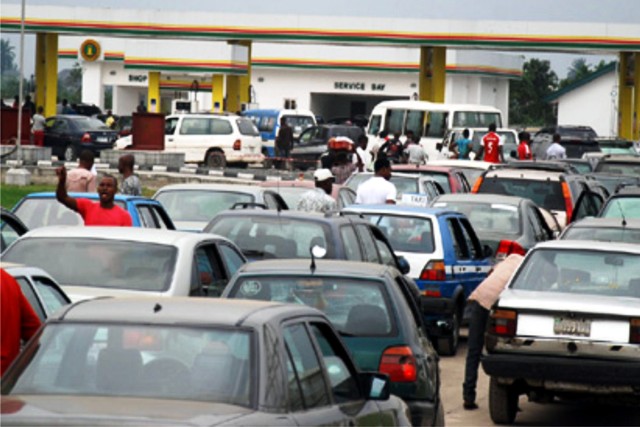Business
Fuel Overpricing: Marketers Set To Sanction Depots, Filling Stations

Oil marketers under the aegis of the Petroleum Retail Outlet Owners Association of Nigeria (PETROAN) have established and deployed a task force to check and sanction filling stations selling Premium Motor Spirit, popularly called petrol, at exorbitant prices.
The Tide source gathered that the decision was taken following reports that some filling stations were dispensing petrol above N300/litre, far higher than the price approved by the Federal Government.
On Wednesday, the source further gathered that while filling stations operated by major marketers and the Nigerian National Petroleum Company Limited (NNPCL) were selling petrol between N194 and N200/litre, other outlets operated by independent marketers dispensed the product between N250 and N340/litre.
The report stated that this was despite the insistence of the Federal Government that there was no approval for an increase in the pump price of petrol, coupled with the government’s demand that PMS should not be dispensed above the approved rate.
“Government will not approve any increase of PMS (price) secretly without due consultations with the relevant stakeholders.
“The President has not directed the Nigerian Midstream and Downstream Petroleum Regulatory Authority (NMDPRA) or any agency for that matter to increase the price of fuel.
“This is not the time for any increase in the pump price of PMS,” the Minister of State for Petroleum Resources, Chief Timipre Sylva, had stated recently.
Reacting to the high cost of petrol, particularly outside Abuja and Lagos, on Wednesday, the President, PETROAN, Billy Gillis-Harry, said the association had deployed a task force to check the menace.
Speaking to the source, he said, “We frown at anybody selling so much above the price of what should be adequate. If they accessed the product at a high rate, then we would not sanction them.
“But if they accessed the product from NNPCL and sell it at exorbitant rates of N220, N250, we will sanction you. It is getting very punitive. So our task force now goes around and when we get them we invoke the powers of the NMDPRA over them.”
The NMDPRA is the Federal Government’s agency responsible for regulating the midstream and downstream oil sectors.
Gilly-Harry added, “By the time they (defaulters) go and settle all their fines, they will know that it is not worth selling at exorbitant prices with the intention to profiteer.
“That is what we are doing right now and I think Nigerians should be appreciative of PETROAN as regards this development”.
He explained that marketers who accessed the product from NNPCL should not dispense the commodity above N200/litre, but was quick to state that it was currently tough to get PMS from NNPCL.
“If you bought from NNPCL, you must be duty-bound to sell at a maximum of N200/litre, because NNPC sells at a maximum of N194/litre. So for some independent marketers, it is just N6 more, but the truth is that we are not seeing the product.
“Some of us who paid for products since October, have not been able to load till now, and the cost around this is increasing every day. So by the time they load it, you can imagine the cost burden on the marketers”, he stated.
The oil marketers’ president, however, assured Nigerians that PETROAN would work hard to curtail the activities of dealers who try to profiteer by dispensing petrol at exorbitant rates.
Meanwhile, oil marketers have threatened to name and expose private depot owners refusing to comply with the Federal Government’s directive to sell products at a regulated price of N172 per litre.
The National Controller, Operation, Independent Petroleum Marketers Association of Nigeria, Mike Osatuyi, who disclosed this to The Tide’s source, said defaulters would be exposed after the general elections.
According to him, apart from Emadeb who has been selling to IPMAN members at N172/litre, other depot owners currently sell above N200/litre.
The Chairman, Satellite Depot, Akin Akinrinade, also confirmed the price discrepancies to The PUNCH on Tuesday.
He said, “It is only Emadeb that currently sells to us at N172 per litre. We are going to start naming all of them that refused to sell to us at the government-regulated price one by one after the elections. IPMAN members can’t bear the brunt of price differences.”
IPMAN with over 30,000 members currently controls about 80 per cent per cent of petrol distribution across the country.
Nigeria consumes between 60 and 66 million litres of petrol per day, according to data provided by the Nigerian National Petroleum Company Limited.
Akinrinade also told The PUNCH that only NNPCL depots at Satellite and Ejigbo sell to his members at N172/litre.
“Things are moving fine now because there are products. Our members have continued to load, however, only NNPCL depots at Satellite and Ejigbo sell to us at N172 per litre. Private depots sell above N200 per litre”, he added.
The Federal Government task force team earlier in the month said it had teamed up with private depots to sell petrol to marketers at a regulated price of N172 per litre.
Business
NCDMB, Dangote Refinery Unveil JTC On Deepening Local Content
Business
Food Security: NDDC Pays Counterpart Fund For LIFE-ND Project
Business
Replace Nipa Palms With Mangroove In Ogoni, Group Urges FG, HYPREP
-
Rivers4 days ago
HOS Tasks Rural Dwellers On RAAMP … As Project Sensitization Team Visit Degema, AKULGA
-

 Politics4 days ago
Politics4 days agoReps Constitution Review Committee Holds Zonal Hearing For Rivers, C’River, Akwa Ibom In Calabar
-
Opinion4 days ago
Is Nigeria Democratic Nation?
-

 News4 days ago
News4 days agoI’m Committed To Community Dev – Ajinwo
-

 News4 days ago
News4 days ago2027: I Stand With Southern Presidency -Ortom
-
Politics4 days ago
Lagos LG Polls: Police Restrict Movement, Tightens Security
-

 News4 days ago
News4 days agoSenate Replaces Natasha As Committee Chairman
-
Opinion4 days ago
Checking Herdsmen Rampage

